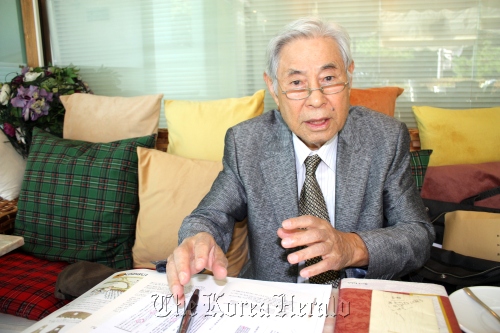Professor presents new interpretation of ancient Chinese historical texts
During ancient times in what is now Kyushu in southern Japan, people had tattoos, made a living by farming silkworms, and buried their dead in earthen jars and portal tombs.
And they were described as being afraid of “Daesol.” The term has been widely perceived as an adverb or an administrative institution by many historians in Asia, but has now been given a whole new interpretation.
Former diplomat and scholar Soh Jin-chull in August released a thesis arguing that the ancient state in that part of Japan, named Daewae, (“Yamato” in Japanese) was a subordinate of Mahan, a confederacy of states that existed around the first century B.C. to third century A.D. in the southern Korean Peninsula. Soh’s argument is largely based on the term “Daesol,” which appears in numerous ancient Korean and Chinese historical texts including Korea’s “Samguk Sagi” and China’s “Book of the Later Han” and the “Records of Three Kingdoms.”
“Daesol in fact refers to the ruling officers of Mahan, who would often visit Daewae and govern the people there, controlling the markets and taxation matters of the country,” Soh told The Korea Herald. “It is another term used for Dalsol, the second highest public officer in Baekje.”
During ancient times in what is now Kyushu in southern Japan, people had tattoos, made a living by farming silkworms, and buried their dead in earthen jars and portal tombs.
And they were described as being afraid of “Daesol.” The term has been widely perceived as an adverb or an administrative institution by many historians in Asia, but has now been given a whole new interpretation.
Former diplomat and scholar Soh Jin-chull in August released a thesis arguing that the ancient state in that part of Japan, named Daewae, (“Yamato” in Japanese) was a subordinate of Mahan, a confederacy of states that existed around the first century B.C. to third century A.D. in the southern Korean Peninsula. Soh’s argument is largely based on the term “Daesol,” which appears in numerous ancient Korean and Chinese historical texts including Korea’s “Samguk Sagi” and China’s “Book of the Later Han” and the “Records of Three Kingdoms.”
“Daesol in fact refers to the ruling officers of Mahan, who would often visit Daewae and govern the people there, controlling the markets and taxation matters of the country,” Soh told The Korea Herald. “It is another term used for Dalsol, the second highest public officer in Baekje.”

Baekje (B.C. 18―A.D. 660), which was one of the three kingdoms of Korea, along with Goguryeo and Silla, started off as a member statelet of Mahan and eventually overtook the confederacy.
According to “Samguk Sagi” (History of the Three Kingdoms), written in 1145 by Goryeo (918-1392) historian Kim Bu-sik and a team of scholars, the very first Dalsols were appointed during the reign of King Goi of Baekje, who ruled the country from 234 to 286.
“Book of the Later Han,” the Chinese historical record which was written in the fifth century, also mentions a similar term “Dae-sol” to describe Mahan. “All Daesols tie their hair up, dress in hemp garments and grass shoes,” says the ancient text, according to Soh’s interpretation.
“Most of the scholars interpreted the word ‘Daesol’ as an adverb ‘almost,’ thinking the sentence meant ‘Most of the Mahan people tie their hair up,’” Soh explained.
“Yet because there’s another adverb ‘gae,’ meaning ‘all’ or ‘every’ in the sentence, the word ‘Daesol’ should be interpreted as a noun. The ancient text states that Daesol also existed in Mahan, as well as Baekje.”
According to Soh, the “Records of Three Kingdoms,” the Chinese historical record which was written in the third century, also mentions “Daesol.”
“In the northern region of Daewae, there is a Daesol who inspects its every statelet, and they are very afraid of him,” Soh interpreted the text for The Korea Herald.
“Most academics in Asia have been interpreting the term ‘Dae-sol’ in this sentence as an administrative institution,” he said. “But the term only existed in Baekje and Mahan.”
And most importantly, a Chinese historical record, which was written in A.D. 1000, specifically mentions “Daesol,” in another word, “Dal-sol” in describing different types of Baekje public officers and their rankings, Soh said.
The fact that many dolmens and earthen jar relics ― which strikingly resemble those found on the Korean Peninsula ― are being discovered in Kyushu of Japan, is further proof that Daewae was ruled by Mahan, Soh said.
“It seems like people of Mahan and Dae-wae shared the same funeral customs,” Soh said. “But many people don’t know that relics of portal tombs have even been discovered in Kyushu. It’s strangely unknown.”
The scholar said he wants his thesis to be read by as many Asian scholars as possible, though he doesn’t expect those in Asia to be convinced by his argument right away.
“I am just offering a new perspective on this ancient history,” Soh said.
By Claire Lee (dyc@heraldcorp.com)


















